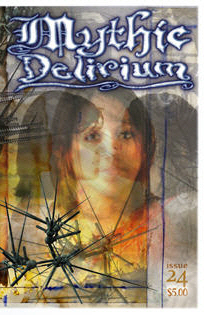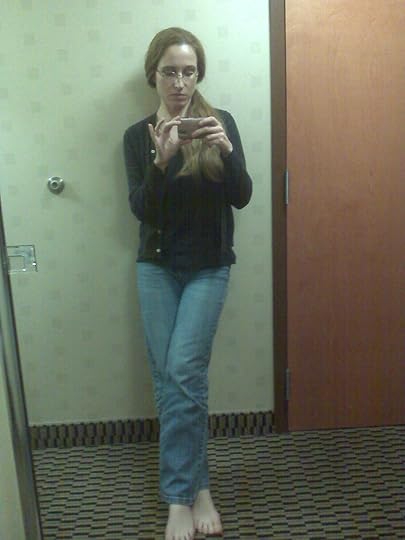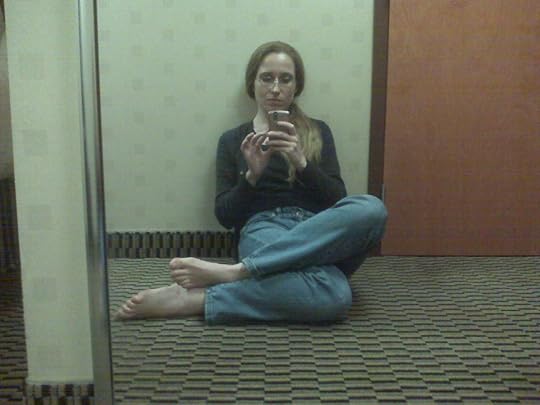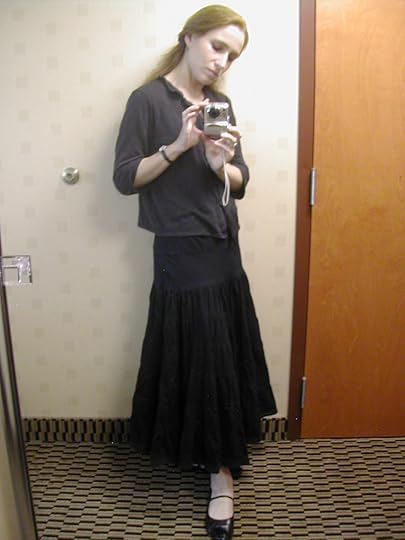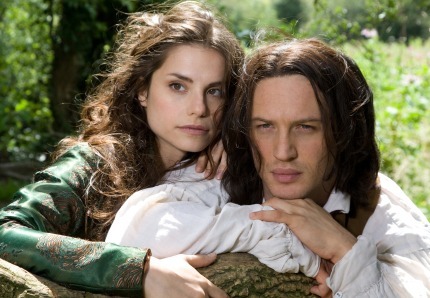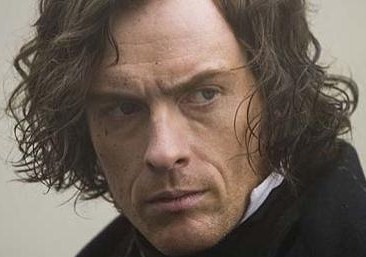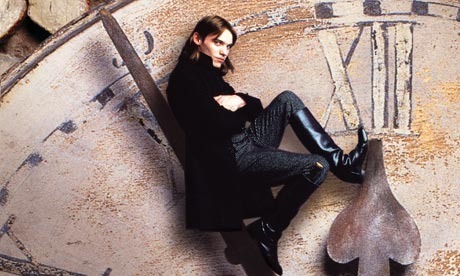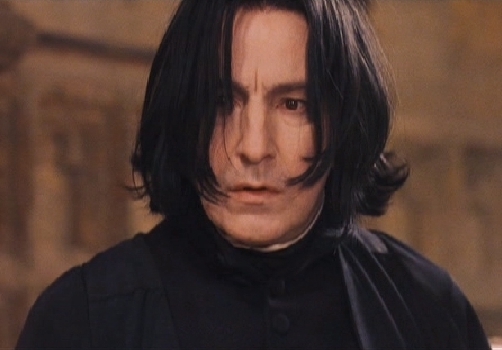Theodora Goss's Blog, page 55
July 1, 2011
Reading Narnia
Hello, July. You snuck up on me. I woke up this morning thinking it was still June, but it wasn't.
I had gone to sleep at around 4:00 a.m. after finishing my Folkroots column. Then I had woken up early to read it one more time before sending it off. Once I sent it off, I went back to sleep and woke up in the afternoon. Tired, but feeling relieved. June was difficult, and I had so many deadlines, but I made them, at least the ones I had to make. And now it's July and I have a month ahead of me in which all I need to do is work on the dissertation. Honestly, it's sort of a relief.
The Folkroots column I just turned in is the one on Narnia, and I know some of you have been waiting for that one. I think it's good – I certainly enjoyed writing it. I had to read all the Narnia books again, and I read Peter Schakel's The Way Into Narnia: A Reader's Guide and Laura Miller's The Magician's Book: A Skeptic's Adventures in Narnia. I'm actually still reading Miller's book. When you're writing a column, you end up skimming so much, and now I'm going back and reading it in a more leisurely way. It's making me think a lot about my own writing, because it's the sort of thing I like reading about literature: both scholarly and intensely personal. And you see, that's not a way I'm necessarily allowed to write as an actual scholar, an academic. But it's a way I like writing very much. It makes me think about what I'm going to do with my academic credentials, other than teach. Because I want to write books, but I also want to write about books. I'm just not sure how. Academicese doesn't come that easily to me. But these Folkroots columns I'm doing – oh, how I love doing them! It's a great pleasure to write about scholarly subjects – or to treat fantasy as a scholarly subject – in a way that any reader can understand. Not in academicese.
One thing I realized as I was writing this particular column is that the Narnia books still have tremendous power for me. Even when I was skimming, I was tearing up – when Fledge gets his wings in The Magician's Nephew, for example. Or when the Bridge of Beruna comes down in Prince Caspian. And I still hated reading The Last Battle. It makes me so angry that Lewis created Narnia and then destroyed it. And replaced it with Aslan's country. Who wants to go to Aslan's country? Not me, I can tell you. I want Narnia, with all its adventures and perils. There are no adventures in Aslan's country.
I thought about what gave Narnia this particular power, because when I read The Hobbit, it didn't have the same magic for me. I loved it, but I didn't want to go to Middle Earth, particularly.
I think it was in part that Lewis made me a pantheist. Narnia was so alive, with its satyrs, dryads and hamadryads, centaurs, dwarves. The land itself was alive, in a way Middle Earth wasn't. It was a fairy tale, whereas The Hobbit was a prose epic. It fulfilled all my wishes: in Narnia, you could become a king or queen, you could dance with the trees themselves, you could talk to the animals and they would talk back. I wanted my own world to be that way. Lewis taught me a certain set of values, which weren't necessarily the values he meant to teach. They had to do with our relationship to the natural world, with valuing each tree, each stream. With believing in magic.
He also made me believe in a certain type of prose. Reading the books again, I realized how well they are written, now clean they are, how quickly they move. It's a sort of prose I associate with the first half of the twentieth century. I see it in George Orwell, in Dorothy Sayers, in E.M. Forster. I know, completely different writers, but there's something about their prose – they are working from similar principles. I wish I knew exactly what it was, but it's a clarity, a facility with sentences. Sayers is much more of a craftsman than Forster, obviously. Forster is the artist. But still, there's something. And it's something I don't often hear in prose nowadays. Modern prose often strikes me as muddy. When I do hear that clear, fluid prose, I always feel a sort of gratitude.
I was thinking of Narnian values today in particular, because this morning I read two stories in The New York Times. The first was actually a series of short opinion pieces called "Why Did Wild Nail Polish Go Mainstream?" The writers were opining on that question. Now, you and I may have different opinions on nail polish. (I don't understand why anyone would use the stuff, except as a subversive statement. Like, men painting their toenails pink. Have you ever seen what happens to nails under it?) But why in the world is The New York Times hosting a debate about it? Surely there are actual events happening in the world. The second was a story on the names that paint companies choose for their colors: "We Call It Brown. They Call It 'Weekend in the Country.'" Did you know that Benjamin Moore offers 3,300 paint colors? And that's just one company. What sort of society needs 3,300 paint colors? So there I was, having just finished my Folkroots column, having just read about battling giants and riding on the backs of centaurs. About the dangers of the desert, the beauty of the forest, the sea of lilies at the end of the world. About Reepicheep and Puddleglum. And suddenly I was confronted with the information that I live in a society in which there are at least 3,300 different paint colors. In which women painting their fingernails blue or green is news. And I thought, no one paints either rooms or their nails in Narnia. And then I thought, we're doomed.
So here I am in July, and it's going to be another busy month, but hopefully not quite so busy as June was. And I'm thinking of the blog post I wrote on alternative values, and thinking, they're Narnian values, and Middle Earth values, and the values of the magical, fantastical lands I love. And I'm going to live by them, even when they make absolutely no sense in this society, which in turn makes so little sense to me. As Puddleglum says to the Lady of the Green Kirtle,
"All you've been saying is quite right, I shouldn't wonder. I'm a chap who always liked to know the worst and then put the best face I can on it. So I won't deny any of what you said. But there's one thing more to be said, even so. Suppose we have only dreamed, or made up, all those things – trees and grass and sun and moon and stars and Aslan himself. Suppose we have. Then all I can say is that, in that case, the made-up things seem a good deal more important than the real ones. Suppose this black pit of a kingdom of yours is the only world. Well, it strikes me as a pretty poor one. And that's a funny thing, when you come to think of it. We're just babies making up a game, if you're right. But four babies playing a game can make a play-world which licks your real world hollow. That's why I'm going to stand by the play world. I'm on Aslan's side even if there isn't any Aslan to lead it. I'm going to live as like a Narnian as I can even if there isn't any Narnia."
I do love Puddleglum.








June 28, 2011
Poetry and Prose
So, how did you do on the Nerd Test? I ask because according to my stats, more than two hundred of you clicked on it today (not counting those of you who clicked on the blog in general). I hope you did well and are a properly nerdy lot. Like me. I can draw you a Tardis, write Vogon poetry, and demonstrate the Vulcan neck pinch if you stand still long enough. I know the secret to life, the universe, and everything. I can probably even find you an M-class planet, if you lend me your spaceship. Because I'm just that kind of girl.
I'm sitting here after a long, tiring day, wondering what I should write about. I'm eating a Cherry Pie Lärabar, which (you're not going to believe this but it's true) tastes exactly like cherry pie, and some lime fizzy water. So self-indulgent of me.
I think I'll write about poetry.
At Odyssey, one of the students, Rich Baldwin, asked me how writing poetry has affected my prose writing. (Rich is a poet himself, or was a poet first before turning to prose.) Honestly, I've written very little poetry lately, and very little of what I've written is good. A poem of mine (which I hope is good) just came out in Mythic Delirium 24:
The poem is called "Binnorie," and to read it you'll have to buy the magazine. But if you want to read what I consider to be a good poem of mine online, try "The Witch," which is one of my favorites. Or I'll make it even easier for you and include "Beauty to the Beast," which I wrote years and years ago, below. If you want to listen to me reading it, click on the title.
When I dare walk in fields, barefoot and tender,
trace thorns with my finger, swallow amber,
crawl into the badger's chamber, comb
lightning's loose hair in a crashing storm,
walk in a wolf's eye, lie
naked on granite, ignore the curse
on the castle door, drive a tooth into the boar's hide,
ride adders, tangle the horned horse –
when I dare watch the east with unprotected eyes,
then I dare love you, Beast.
I think it's a poem that says, love is hard. Love anyway. Which is what the story of "Beauty and the Beast" fundamentally says.
Although I haven't written much poetry lately, I wrote poetry first. (I have embarrassing notebooks of poetry from high school to prove it.) And I think writing poetry has affected my prose. In my best stories, every word counts. At the same time, I have to recognize that prose is not poetry. It is more jagged, more forgiving. It has more of a relationship to everyday life, to the mortality that characterizes the human condition. Poetry, no matter how rudimentary, even if it is a limerick, shares something with the divine: form. A single, unifying form whereas prose has forms, many of them, slipping and sliding against one another. Sometimes grating. Read Virginia Woolf or James Joyce, which is about as close as you will get to poetry in prose, and you will see how prose has forms, rather than form.
What I got from poetry is that I write by ear. I hear the words, the sentences as I write. And yet, if I slip too far into poetry, as I'm doing now, I'm lost. Can you hear me doing it? Can you hear me slipping into poetry, sliding into it – and can you see that soon, paying attention to the sounds, I will lose content? I will forget what I'm writing about, until I consciously break it. Break the poetry, write in plain, ordinary prose.
Honestly, after the difficulty of poetry, prose is a relief.
But what a joy it is, to be able to slip and slide that way in language. To be able to deploy both. To use a word like deploy. I feel about language the way I sometimes think birds feel about air.
For any writer, I would say, try writing poetry. It may be terrible. Some of the poetry I write is terrible. But so what? It will still teach you about lines, rhythms, pauses. It will force you to slow down and think. And that's good, when you're a writer. It's good to confront, and become conscious of, your own technique.
But what do we do with poetry? Few people read it. (I do, of course – but then, I do a lot of things other people don't.) I think we can still publish poetry on a page, but what we really need is for poetry to be read. We need poetry videos, like music videos. If I had any money, I would make a video of "Beauty to the Beast," with music. Or a longer video of "The Witch." In her rags, her madness. Wouldn't that be interesting?
I need to get back to work, because tonight I still have a column to finish. But I wanted to end with one of my favorite poems. It's by Edna St. Vincent Millay:
Love Is Not All
Love is not all: it is not meat nor drink
Nor slumber nor a roof against the rain;
Nor yet a floating spar to men that sink
And rise and sink and rise and sink again;
Love can not fill the thickened lung with breath,
Nor clean the blood, nor set the fractured bone;
Yet many a man is making friends with death
Even as I speak, for lack of love alone.
It well may be that in a difficult hour,
Pinned down by pain and moaning for release,
Or nagged by want past resolution's power,
I might be driven to sell your love for peace,
Or trade the memory of this night for food.
It well may be. I do not think I would.
The reason I'm ending with this poem is that recently, I found a reading of it by Millay on YouTube.

I don't think I would either, Edna. (She has the perfect voice for my witch poem. I wish she could read it.)
While we're on the subject of Odyssey, Martin Larsson, another Odyssey student, wrote a blog post about the day I spent there: "Friday, Goss-style." I thought you might like to read about how my teaching went, from a student's perspective.
Being at Odyssey reminded me that this time last year, I was at a writing workshop myself. And it made me think about how much my life has changed this year, how much I've changed. More, in some ways, than during any other year of my life. It's as though I started out as a caterpillar and went through the painful chrysalis stage (when the caterpillar thinks, what in the world is happening to me)? And I'm on my way to being something else. I wouldn't mind it being this:
But perhaps it's only this, I don't know:
Either one is fine, really. I can feel myself sometimes, beating my wings, wanting to get out. It's as though whatever transformation started then isn't yet complete. But it will be. And then, I'll get to see what I've become. As will you.








June 27, 2011
Writing Despite It All
I spent the afternoon in Narnia.
This is actually my third post in a row on being an introvert. The first was "On Withdrawing," the second was "Introversion," and this is the third one.
But yesterday, Jason posted the following in the comment section:
"Okay, here's another question (whether you choose to devote another blog post to it or not): With all the demands that teaching full-time entails, what have you done to establish time for your creative writing? (Because I can tell you, mine has suffered quite a lot; I've got 40,000 words of a novel languishing on my hard drive for years.)"
And I know exactly what he means. Although to be honest, teaching is not the problem. It's teaching plus. This year, the plus has included writing the dissertation, and I imagine that if I can write a dissertation while teaching, I can certainly write a novel, which is much easier for me. The plus also includes my personal obligations, including taking care of Ophelia, which is what I was doing today.
Her last day of school was Friday, and so today she was home with me. She'll be home with me tomorrow as well, and then tomorrow night Kendrick will take her to Colorado, where her grandparents have a vacation house. She'll stay with them for two weeks, swimming and riding.
Spending two days watching her is not a problem, or shouldn't be, except that my Folkroots column is due on the 29th. I would have gotten it closer to done earlier but the semester ended and my grades were due, and then there was Wiscon, and then I got sick, and then I needed to do the emergency revising that I mentioned a while back, and then there was Odyssey, and now here I am. Scrambling, as I almost never used to, but as I have so often this year. Writing a 4000 word column while watching a seven-year-old.
So what did I do today? Well first, I told her that if she finished her first set of ten hours in the Reading Challenge, we could go to the library and pick up a prize. She had picked up the challenge less than a week ago, but was already close to her first ten hours. So I spent some time this morning doing research while she read. When she was done, we went to the library to pick up her prize (a water pistol, about which we made one rule: no shooting me), and then of course we got ice cream and ate it on the Battle Green. When we got home, we discussed the fact that I needed to get work done. She had taken out some Shaun the Sheep videos, so she watched those while I worked (more research, and of course typing). When she was tired of the videos, we went to the park, but I'd been able to work for several hours. (I know, videos. But she's going to spend a very active two weeks in Colorado, so I don't think a few videos about stop-motion sheep are going to hurt her. And they're very clever videos. British humor, you know.)
How do you write despite it all? Well, first, you need to decide that writing is a priority. This is where the arrogance and ruthlessness come in, I suppose. I'm arrogant in that I've decided my writing is important enough to prioritize. Important enough that I insist on space and time for myself. Going to Wiscon, teaching at Odyssey, writing my column: those are all parts of my career. And I'm ruthless enough to say, I'm going to do them. Even if I have to say, "I can't play right now because I need to finish my column, all right?"
But you know what? I want Ophelia to grow up watching me set goals for myself, accomplish them, and gain recognition for my work. I grew up with parents who traveled all over the world, had multiple degrees, were accomplished in their fields. And that made a significant difference in my life. I grew up assuming I could do the same.
I don't know how to give anyone specific advice on making time for writing. So much depends on individual circumstances. But I think the first step is to make writing a priority. Many people don't do that. They try to fit it in where they can, rather than fitting everything else around it. I used to do that too. But this year, specifically, my perspective changed. I think my perspective on myself changed, as well as on my writing. And I started to think of the writing as what I knew I was going to do. Then I thought, how can I fit in everything else?
My posts have rambled lately! I get to the end of them and realize that what I've said wasn't at all what I meant to say. I think it's because I'm still tired. What was I talking about, anyway? Prioritizing your writing. Being an introvert in a society that doesn't value introversion. Which I've actually said nothing about, except implicitly: you need to make time for yourself. You need to insist on space. Ruthlessly, otherwise you will not be the person you want to be, which means you can't be the parent your child needs either. I believe strongly that in order to be good parents, in order to be role models for our children, we need to be fulfilled as individuals. We need to follow our own destinies, so they can see us doing so, and do so in their own lives.
Am I tying all this together? Perhaps if I introduce a quotation from C.S. Lewis: "I am sure that some are born to write as trees are born to bear leaves." If you're one of those who are born to write, you need to create the space and time. Otherwise, you will continue to have that vague feeling of discontent. You know what I mean, don't you? The feeling that lets you know you're not doing what you should be.
As I write this, Ophelia is standing at my shoulder, squirting water into her mouth from her water pistol. I ask her if she likes that I'm a writer. She says yes. I ask her why, and she says, "Remember when you wrote about me?" I've written about her many times, so I'm not sure which time she means. I say, "I'll write about you right now." She says, "Then I'll be famous!" And then I get some very wet goodnight kisses. (Another one of our rules: after bedtime, she has to be in her room, but she can decide to stay up and play for a while. She usually puts herself to bed fairly quickly. But it's another rule that avoids unnecessary fuss.)
So, on the 29th I'll turn in my Folkroots column, and then I'll have two solid weeks with absolutely no distractions. To do nothing but work on the dissertation. It's going to be exhausting, and I'm going to hate it. But at least it will get done. And then, after I've defended in the fall – well. Just wait and see the magnificent things I'll do.








June 26, 2011
Nerd Test
1. Where is your towel?
2. Translate: Ph'nglui mglw'nafh Cthulhu R'lyeh wgah'nagl fhtagn.
3. How would you defeat a Dalek? (Your answer may not rely on the use of stairs.)
4. Write Vogon poetry. (Any poetic form is acceptable.)
5. Damn it, Jim, I'm a doctor, not a __________.
6. The Hellmouth is located in __________, California.
7. What is the answer to life, the universe, and everything?
8. Demonstrate the Vulcan neck pinch. (You must provide your own redshirt.)
9. Draw a Tardis. (Use the back of this page and a blue pencil.)
10. Locate an M-Class Planet. (You may use a spaceship for this question.)
11. Angel or Spike? (Support your answer with a short paragraph.)
12. Laugh at the following:










Introversion
All right, all right, you were right. I mean those of you who said I needed to take better care of myself, that I wasn't particularly good at doing so. I've spent most of today randomly falling asleep. So yes, I've pushed myself too hard. It's time to rest. (I'm not sure when I'll find the time, but I'm trying.)
Yesterday, my friend Jason Eric Lundberg wrote, in a comment to my blog post "On Withdrawing,"
"I often feel the need to withdraw, especially now that I'm teaching full time (and have been since 2008). I'm exhausted nearly every single day with all of the interactions that I have to make with students, colleagues, and management."
Jason, I hope you don't mind my quoting you! Jason is a wonderful writer and editor, and is married to one of my favorite fantasy artists, Janet Chui. (I'm very lucky to own two of her paintings.) They live in Singapore with their daughter Anya, whom I mention because Jason also wrote,
"How have you been able to find your own space and withdraw when raising a little one? Anya's 20 months old now, which means for 20 months I've hardly ever had a chance to be alone (and you know how that affects an introvert)."
And then, this morning, as I do every morning, I skimmed the front page of the New York Times online. And I found an opinion piece titled "Shyness: Evolutionary Tactic?" that begins,
"A beautiful woman lowers her eyes demurely beneath a hat. In an earlier era, her gaze might have signaled a mysterious allure. But this is a 2003 advertisement for Zoloft, a selective serotonin reuptake inhibitor (S.S.R.I.) approved by the F.D.A. to treat social anxiety disorder. 'Is she just shy? Or is it Social Anxiety Disorder?' reads the caption, suggesting that the young woman is not alluring at all. She is sick."
It's about our tendency, as a society, to pathologize introversion or shyness, which I think are actually two different things. (For example, I'm introverted, but not usually shy. Although I can be.)
So evidently this is an important issue not only for introverts like me and Jason, trying to figure out how to live our lives in a the midst of what is often a tiring society, but also because it's a part of the social discourse. Therefore, I thought I would write about it again today.
Like Jason, I teach. During a typical semester, I have sixty students. I spend nine hours a week teaching them, in groups of twenty at a time. And I spend many more hours meeting with them, emailing them. I teach writing, which is much more intensive than teaching literature. You can lecture about literature, but you have to teach writing as a workshop. That means many hours of meeting with students about their drafts. And I love teaching. But how do I reconcile it with my need for time alone?
I think what I do is make sure that throughout the day, I have time and space for myself. I close my office door and spend time reading. Or I take a walk around campus, anything that will allow me to clear my head, to hear my own thoughts again. When I started teaching, I tended to assume that I owed my students all my time, that I was somehow responsible for their progress. And I realized, as I learned to teach more effectively, that the more I made them responsible for their progress, the more they took on that responsibility. I still work fifty- to sixty-hour weeks. But I try to make sure that I have time to myself, for myself. (One thing this means, practically, is that I assign more peer editing than I used to. This past semester, we discussed the concept of copyediting, and they copyedited each others' papers before handing in the final drafts. How this worked: they sat in groups and handed their papers to the right. The person on the right would copyedit one paragraph, then hand it to the right again, so each paragraph was copyedited by a different person. At the end of the semester, the students told me how much they had liked having other people look at their papers in the final stages. And I got better papers, as a result.)
And like Jason, I have a daughter, although mine is considerably older. For anyone with a child under two, I would say, it gets better, a lot better, but those first few years are intense. Now that Ophelia's seven, it's so much easier – in part I think because of how we handled those early years. For example, when she was upset, we would ask if she wanted to have a temper tandrum. If she did, we would say, how about for a minute? We would agree on a time, and she would have a temper tantrum until we said time was up. It wouldn't be much of a tantrum, because the concept of agreeing on a temper tantrum was so funny. It would be a sort of fake tantrum. (Or what was even funnier? We would offer to have a temper tantrum for her. She would love watching an adult have a tantrum.) But the point was, she was allowed to have it.
There weren't many temper tantrums anyway, I think because I decided early on that I wouldn't make Ophelia do anything I wouldn't want to do at her age. So for example, I never took her shopping unless I was buying something for her, because I remembered how boring it was to have to go shopping with an adult. If I had to take her, to the grocery store for example, we would make a game of it. Before we bought anything, we would go around and try all the samples. And afterward, she would always be allowed to pick out a special treat. (This worked in part because I would take her to natural food stores, not supermarkets. Those fluorescent lights! Children respond by getting anxious, and they're right to.) I once had a mother tell me that she insisted her children try new foods. A son of hers refused to eat a particular food, and so he was given no other food until he tried it. I believe he "broke" the next morning, and tried some after a night with no supper. I thought, what are you going to do next, send him to the Marshalsea, where Little Dorrit can take care of him? If someone treated me like that as an adult, I would hate him with a deep and abiding hatred. Why would I treat a child, who is more vulnerable, with less consideration than I would treat an adult?
I'm trying to gather my thoughts here, because my relationship with Ophelia did not grow out of a systematic philosophy. But it does reflect a central belief I came to early: that she was a person, who deserved the same treatment from me as any other person. When we noticed that she started asking for toys on a regular basis, I suggested an allowance of $5 per week. She can spend that money on anything she wants. The interesting result is that she does not ask for toys randomly anymore. Rather, she saves her allowance for them. For a seven-year-old, she is exceptionally self-reliant and mature. Of course, she's also grown up in a quiet household with people who negotiate rather than arguing. And she's been taught to negotiate herself. So when she asks for dessert before dinner, I tell her, "All right, as long as you know that you won't get dessert after dinner." And we agree. After all, which is more important – eating dessert after dinner (which is an arbitrary social rule) or learning to negotiate for what you want (a skill she will need for the rest of her life)?
I don't know if these thoughts are useful at all to other parents. Children are all different, and I happen to have gotten one who is particularly mature for her age. I don't know how much of it is the way she was raised, or just her. But I do know how difficult it is, being a teacher and parent when you're an introvert – when you need time alone, and sometimes think about how lovely it would be to join that monastic order on a Scottish island where they never speak, and the boat only comes every two months. (I've been told they rent out rooms and have a waiting list, so evidently there are a lot of us out there.)
I have lots of thoughts on how to survive as an introvert in a society that values extroversion – or tries to sell us Zoloft. But I've written long enough on this topic, at least for tonight. It's time for some PBS and an orange cranberry cereal bar, which are some of the pleasures that get me through a busy day. Or even a day that I've spent mostly falling asleep.








June 25, 2011
On Withdrawing
I'm an introvert. When I take those Myers-Briggs tests, I'm consistently an INTJ, which means Introverted, Intuitive, Thinking, Judging. What does that mean? Well, for one thing, it means that these describe me fairly well:
"To outsiders, INTJs may appear to project an aura of 'definiteness,' of self-confidence. This self-confidence, sometimes mistaken for simple arrogance by the less decisive, is actually of a very specific rather than a general nature; its source lies in the specialized knowledge systems that most INTJs start building at an early age."
My specialized knowledge system was literature and writing, and I did indeed start to develop it at an early age. And I do think that I generally appear to be self-confident. I generally am, within my particular area of expertise.
"INTJs are perfectionists, with a seemingly endless capacity for improving upon anything that takes their interest. What prevents them from becoming chronically bogged down in this pursuit of perfection is the pragmatism so characteristic of the type: INTJs apply (often ruthlessly) the criterion 'Does it work?' to everything from their own research efforts to the prevailing social norms. This in turn produces an unusual independence of mind, freeing the INTJ from the constraints of authority, convention, or sentiment for its own sake."
Yes, I'm a perfectionist, and yes, I have a strong pragmatic streak. I want things to work. And be perfect, both. And I hope I have independence of mind. At least, I regularly question what I'm told by society, testing it against my own beliefs and experiences.
"INTJs are known as the 'Systems Builders' of the types, perhaps in part because they possess the unusual trait combination of imagination and reliability. Whatever system an INTJ happens to be working on is for them the equivalent of a moral cause to an INFJ; both perfectionism and disregard for authority may come into play, as INTJs can be unsparing of both themselves and the others on the project."
I think imagination and reliability are actually very good terms to describe how I act in the world. And yes, I am sometimes unsparing of myself, although I do try to be sparing of others. Unless something really does need to get done. (Notice that I'm ignoring the less flattering words, like arrogant and ruthless. I don't think I'm either of those things, in general. But I can be deeply, deeply annoyed when I think something is being done incorrectly.)
"INTJs are usually extremely private people, and can often be naturally impassive as well, which makes them easy to misread and misunderstand. Perhaps the most fundamental problem, however, is that INTJs really want people to make sense. This sometimes results in a peculiar naivete, paralleling that of many Fs – only instead of expecting inexhaustible affection and empathy from a romantic relationship, the INTJ will expect inexhaustible reasonability and directness."
Well, yes, I do usually expect people to make sense, and I sometimes don't understand when they don't respond to situations logically and rationally. That's the Spock in me, I think. And the intensely private part – that's really why I'm mentioning this category at all. Because my streak of introversion is rather strong.
What introversion really means is that in order to operate efficiently, I need time alone. In a quiet place, preferably with dim lights, doing something like this, writing. Time alone gives me energy, whereas time with others drains that energy. As do conflict and mess. (It's difficult to pick an argument with me, because I don't argue unless I absolutely have to. And when I absolutely have to, when it's something I care deeply about, I argue only to win, never for the sake of arguing. Because arguments make me feel sick.)
I'm writing all of this simply to say that today was a withdrawing sort of day. I've been doing a great deal lately, and much of it has included interacting with people. Which is wonderful, and I do love interacting with people – I'm particularly glad that I got to spend so much time with the Odyssey students. But after action and interaction, I always need to withdraw, to go off by myself. The real different between an introvert and an extrovert is that an extrovert gains energy from being with others and loses energy alone, while for an introvert it's the opposite. Being with others is draining, solitude restores.
I think most writers are introverts. They have to be, to be able to spend so much time by themselves, in front of computer screens. They pretend to be extroverts in order to go to conventions and do readings. They become extroverts, temporarily. But then they go back to their houses and cats, where they can be as introverted as they like.
Today, I withdrew. This morning, I dropped off the rental car, then went back home and to bed. I woke very late. Then I did the following:
1. Took Ophelia to downtown Lexington, where we bought ice cream and went to the library to check out movies and more books for the library's Reading Challenge, which she's doing this summer.
2. Drove to my new favorite antiques store, where Ophelia was allowed to pick out one item. (She picked out a small plastic pouch of children's games.) I bought another shelf I had my eye on last week and a linen runner edged in lace.
3. Drove to Whole Foods, where we picked out the ingredients for a special dinner to celebrate the end of her school year: sesame noodles with shrimp and broccoli, and her favorite food, which is sushi.
4. Made the special dinner while Ophelia read for her challenge. Then we ate noodles and sushi. And now I'm going to work on my Folkroots column, which is due on the 29th.
It's been a calm, quiet day.
I don't want every day to be calm and quiet, but I need a certain percentage of my days to be. That's something I need as both a person and a writer.
Tomorrow, I should be more myself. But right now I'm going to sit in bed, wrap a blanket around me, and read ghost stories. A quiet end to a quiet day, that's what I need. I wish the same to all you introverts out there.








June 24, 2011
Back from Odyssey
I had the most wonderful time at the Odyssey writing workshop!
I want to post more about it, but I'm very tired tonight, so you're just going to get a synopsis and some pictures. Yesterday, I drove to New Hampshire, through unexpectedly heavy traffic. But I arrived in time and immediately headed over to St. Anselm College for a reception with the students. I answered their questions for about an hour, being as honest about writing and the industry as I could. At the reception, I received three more stories to critique, so afterward I went back to my hotel room and worked on those. I also went over my talk again. You may remember that it was called Writing Your Voice(s). Here I am, post-reception, looking very tired:
And collapsed. Hotel lights aren't exactly flattering, are they?
The next morning, I headed back to St. Anselm College for a full day. Here I am ready to go over:
Yes, I dressed in all black. In addition to talking about voice, I mentioned my philosophy of packing. If you're a writer, you're always traveling to one convention or another, so you need to be able to pack quickly and easily. I do it by bringing one, or maybe two, colors – and jeans. ICFA was brown. Wiscon was burgundy. Odyssey was black. (Looking at my calender, I realize that I've traveled somewhere almost every month this year. And it will be the same for the rest of the summer, with trips to Asheville and New York.)
First, I gave my talk. Then lunch and critiquing the three stories I had read the night before. Then meeting with four students whose stories I had read and critiqued beforehand. Then dinner and another unscheduled question and answer session, because the students had more questions and of course I wanted to answer them. The students seemed exceptionally smart, talented, and together. I'm not sure my Odyssey class was as together, the third week! And all the stories I read were interesting and accomplished. I would do it again in a heartbeat.
Then I drove back, through no traffic at all. The return trip was so quick and easy. In my email inbox, I found some illustrations for the Secret Project that I'm not yet allowed to show you. But I can't wait, because honestly, they're going to blow you away. Also, my preliminary schedule for Readercon, which is as follows:
Thursday:
9:00 p.m. There's No Homelike Place
Doyle, Goss, Janssen, Kiernan, Warren
Friday:
11:00 a.m. Rudyard Kipling, Fantasist and Modernist
Dozois, Feeley, Goss, Schweitzer, Taaffe
12:00 noon Classic Fiction: Howl's Moving Castle
Cooney, Files, Goss, Link, Taaffe
Saturday:
3:00 p.m. The Rhysling Award Poetry Slan
Allen, Lunde, et al. (I'm part of the al.)
7:00 p.m. Wold Newton Reading Extravaganza: Special Readercon Edition
Rosenfield et al. (Again, I'm an al.)
Sunday:
10:00 a.m. Interstitial Arts Foundation Town Meeting
Allen, Bradford, Kushner, Lipkin, Vanderhooft (I'll be in the audience for this one.)
And I'll have a reading, but I don't yet know when.
So it's been a very writerly sort of day. Talking about writing all day, then coming back to the gorgeous book cover (honestly, I just hope the story lives up to it) and my Readercon schedule. The rest of this week, I have a Folkroots column to finish and a great deal of dissertation work to do, so it's going to be busy. But that's all right. I'm meeting the deadlines (mostly), doing work I'm proud of. And that feels good.








June 23, 2011
Romantic Anti-Heroes
This morning, I rented a car to drive up to New Hampshire. And this afternoon, I'll drive up and meet the Odyssey students. I can't wait!
So I'm writing my blog post for the day this morning instead of this afternoon.
What inspired me today was Alexa Duncan's blog post on her "Love Interest Handicap."
Alexa writes,
"Anyway, I thought I'd use my updates to talk about what I'm discovering about myself as a writer during this process. There are some things all writers have in common, but we also have our weird quirks and hangups. What works for one person doesn't always work for another. Part of becoming a writer is figuring out how you operate, what motivates you, and what will stop you cold, staring at a blinking cursor."
Which I think is very smart. We do all have our own individual quirks, and I find that my problems with writing a love interest are quite different from hers. She goes on,
"Earlier this week, I ran into the Romantic Interest wall. The main character of my novel is a girl (hey, write what you know, right?), and while it isn't the entire point of the story, she's going to have a romantic interest mixed into her adventures. I reached the point in the story where she meets him for the very first time and . . . stopped. This guy was a blank spot in my head. I kind of knew what I wanted him to BE like, but I had not idea how I wanted him to look. Here is the point where I confess that most of the men in my stories are based on my husband to some degree or another. Sure, he may have a different haircut, or maybe some tattoos, but there's always some aspect of him in there."
So I started wondering, how do I write love interests? I actually wrote a love story recently – the Secret Project is a love story. And my love interest in that story is at least somewhat like the love interests I usually write. They are based not so much on real people as on a particular type. (Although I have dated real people who fit that particular type.) I would call it brooding, dark, and damaged. It's the type of the Byronic hero, which is really an anti-hero, isn't it? (I think my attraction to that particular literary figure was influenced both by my reading and my actual experiences.)
So when I think of the love interests I write, I think of certain touchstones. Heathcliff, of course. Here he is, played by Tom Hardy, who was the best Heathcliff I've ever seen. (And his Cathy was thoroughly satisfying, as Cathy rarely is in film or television versions.)
Yes, I know exactly what you're going to say. Heathcliff could never been in a good, sane, healthy relationship. To which I answer, what does literature have to do with good, sane, healthy relationships? (I'm not sure life has much to do with them either, to be honest. I mean, all the good relationships I know have been negotiated over the years and look nothing like the television versions of good relationships. They are highly individual and idiosyncratic. Perhaps because people can't actually live in clichés.)
Anyway, Heathcliff gets the best declaration of love in all of literature, when Cathy says,
"My love for Linton is like the foliage in the woods. Time will change it, I'm well aware, as winter changes the trees – my love for Heathcliff resembles the eternal rocks beneath – a source of little visible delight, but necessary. Nelly, I am Heathcliff – he's always, always in my mind – not as a pleasure, any more than I am always a pleasure to myself – but as my own being – so, don't talk of our separation again – it is impracticable."
My next touchstone is Mr. Rochester. (You saw that coming, didn't you?) Here he is, played by Toby Richards, who is my favorite Mr. Rochester of them all.
I'm not sure the next one is fair, because I've only seen the BBC version, not read the novel. But it's Steerpike from Gormenghast. (Talk about brooding, dark, and deeply, deeply damaged.) Here he is, played by Jonathan Rhys Meyers.
And finally, Severus Snape. I thought the Harry Potter books were generally engaging. I read most of them when I was sick, because they were books I could read when I couldn't focus on much else. But the only part of the books that actually stayed with me, that I continued to care about, was the character of Snape. Of course, it helped that Snape was played by Alan Rickman in the movie versions.
What do these characters have in common? Well, hairstyle, for one. But more importantly, none of them love sensibly. None of them think, is this a good, sane, healthy relationship? Will she be supportive of my aspirations and goals? How will we share the housework? They love intensely, completely, passionately. And I think that's what we want in a love story. (In real life? Well, that's up to the individual, isn't it? Personally, I would take Heathcliff over Mr. Darcy any day.)
My own romantic leads tend to be more realistic. But you can see the Heathcliff in them. In The Mad Scientist's Daughter, I'm not going to focus on romance, except to the extent that Mary already has a crush on Sherlock Holmes. (My Holmes will be more Heathcliffian than the original.) But I hope there will be more novels about these characters, and then they will need to find love interests. I don't know who they will be yet, what they will look like. I have so many late nineteenth-century characters to play with. But I do know those relationships will be troubled, intense, passionate. Because that's the way I write them. What that says about me, I don't know. (Except, perhaps, that I never worry about who's going to do the housework. Which may be a failing of mine, but then, I'm a writer. )








June 22, 2011
Alternative Values
Last night, I watched a PBS documentary called Emile Norman: By His Own Design. Here's a description of the documentary from the PBS website:
"Emile Norman: By His Own Design is a portrait of the self-taught California artist, Emile Norman, who worked with a passion for life, art, nature and freedom that inspired him through seven decades of a changing art scene and turbulent times for a gay man in America.
"The film tells the story of Norman's independent spirit – how it developed from his early days on a walnut ranch in the San Gabriel Valley and brought him success in New York City in the 1940s and 1950s. This independent spirit later gave him the confidence to leave the New York art scene and find freedom in Big Sur, where he and Brooks Clement, his partner of 30 years, built a house and created a haven for a circle of friends that still grows today."
Norman's art is beautiful, but for me, not particularly ground-breaking. What interested me more was the life he and his partner built for themselves in Big Sur. In the mountains, above the sea, they built a house for themselves: an artist's house, in which everything was carefully chosen and finely crafted. It's a beautiful house, filled with art. Norman worked there until he died two years ago, at the age of 91. He and his partner lived through difficult times for gay men, and in Big Sur, they created a sort of alternative society, a place where they could live and create.
There are artists who fit perfectly into the societies they live in. Jeff Koons comes to mind, but you probably already know what I think of Koons and his mylar bunnies. Most artists end up having to create a space for themselves, as Norman did. To create their own societies, with alternative values.
What do I mean by alternative values?
We live in a society that values certain things: popularity, wealth, ease. That's why we have Wal-Mart, fast-food restaurants, hybrid tea roses, The Da Vinci Code, and Las Vegas. It does not particularly value beauty, difficulty, or insight. The artists I like best value those things, and teach us to value those things.
For that reason, I do not like Jeff Koons:
And do I like Andy Goldsworthy:
So I guess the question is, how can I become more like the artists I admire? How can I live a life that honors those values: beauty, difficulty, insight? I suppose one way is by doing what Emile Norman did: creating my own space. I don't have acres in Big Sur, of course. But in the life I live, even in a city like Boston, I can make choices that reflect those values. I can fill my life with beautiful things, and try to create beauty myself. I can choose what is difficult and challenging, rather than what is easy. I can go to the theater, or to see dance. I can spend time in art museums. (I can even try to understand what in the world anyone sees in Jeff Koons.) And I can, in my own art, try to do what challenges me, to embody my own insights and hope they allow others to see the world in new ways.
Although I live in the world, I don't have to accept its values. I can choose my own. That was the lesson of the documentary, for me. It does make life more difficult, not to accept what everyone else accepts. (Because you know me, there I'll be, standing in front of a bottle of shampoo, asking myself, does this embody my values?) But it also makes life more interesting. Instead of Wal-Mart, fast-food restaurants, hybrid tea roses, The Da Vinci Code, and Las Vegas, I choose old hardware stores, corner cafés, Virginia Woolf, and Paris. And someday I will have a garden filled with old roses, albas and gallicas and damasks, with the scents I love.
Perhaps some day, I'll have the sort of space Norman had, with a house that is completely individual. Until then, I'll continue to stand in front of the shampoo bottle, interrogating it. And reading Woolf.
(And, if we live our own lives according to alternative values, perhaps we can eventually change the values of the society we live in. If enough of us insist on equal rights regardless of sexual orientation, on the importance of environmental protection, of all the things we decide we stand for and live by, perhaps the world will begin to look different. That's part of what we do as artists, isn't it? Change the world?)








June 21, 2011
Preparing for Odyssey
Oh my! It's been such a busy week.
Today, I've actually had some time to rest, for the first time in about a week. And you know, it feels nice. I'm eating dinner as I type: a chicken hot dog on a whole-wheat bun with ketchup, a sliced heirloom tomato with salt, and steamed carrots, broccoli, and cauliflower with a pat of Olivio, which is a butter and olive oil blend. And for dessert, blueberries and low-fat cottage cheese.
Over the weekend, I went back to the antiques shop and bought two more pretty things. The first is this collection of shelves:
I love mission-style shelves and stands, and these were particularly inexpensive. And I saw these silver salt and pepper shakers and thought they would be useful:
And today, in the mail, I got a bottle of my new favorite perfume: Pacifica's Persian Rose, which does actually smell like a garden of old roses.
I mention all this because, as I've said before, pretty things get me through. Whether it's a dinner that makes me feel healthy and balanced, or furniture that makes my space neater. Or the scent of roses, which is the freshest, sweetest scent I know.
As you know, I spent this week fixing things, but I think they're all fixed now. So I can go on to the other things I need to do, which are preparing to teach at Odyssey and writing my Folkroots column. Although I've actually been working on both of those things for a while now. I just need to pull what I've already done together.
My talk for Odyssey will be on Finding Your Voice(s), and I'm thinking about that phrase in three ways. First, in terms of your identity as a writer: what is your individual voice? Second, in terms of the voices in your stories: the voices of your various characters, as well as your narrator who is, of course, a character as well. And third, in terms of what you can give voice to. Can you give voice to something that has no voice? Can you make an ant speak? How about a city? I think of these three ways of talking about voice as focused on identity, versatility, and diversity.
Obviously, I'm not going to give you the substance of my Odyssey talk. You'd have to come to Odyssey for that. But I thought it might interest you to know what I'm going to talk about and how I'm thinking about it. And of course I'm going to have exercises. For example, I'm going to ask the students to compare passages written in different voices and try to figure out how those voices are produced. How does the author create the voice in the passage? What sorts of words does he or she use? What sorts of punctuation? So we're going to get deeply into technique, I think.
I've been thinking about voice myself, lately. I started thinking about it last summer at the Sycamore Hill writing workshop, where a fellow writer said, about a story I had written, "I wanted a Theodora Goss story." And I had to think about what that meant, what a Theodora Goss story was. Particularly what that meant to me, to write like myself. I realized that there was a Theodora Goss story, that there was a voice that was authentically mine. Which didn't mean that I couldn't experiment with other voices, of course. But underneath every voice I wrote in, there had to be something of myself. The story as a whole had to be a Theodora Goss story, had to belong to me. I realized that I wanted to write in my voice. (Friends of mine have used pseudonyms, but somehow, I don't think I ever will.)
So I'm looking forward to typing up the notes I've made for my talk, which is what I'll do tonight. And then I have some critiquing of student stories to do. And Thursday I'll drive up and meet the students. I don't think it even entered my head, when I went to Odyssey a decade ago, that someday I would be teaching there myself.
I've also been thinking about teaching, just in general. I've wondered, in the past, if I would ever give up teaching to just write, if I had the opportunity. And you know what? I don't think I would. I love teaching too much. It gets me out, gets me talking. And I love working with students.
I have so much to do this summer, but I know that I'm heading to a place where I'll have incredible opportunities: to write, to teach, to be the self I want and was meant to be. I'll leave you with one thought: what I've been working on all this week is the Secret Project. And I think it's going to be beautiful. I can't wait to tell you more about it.









